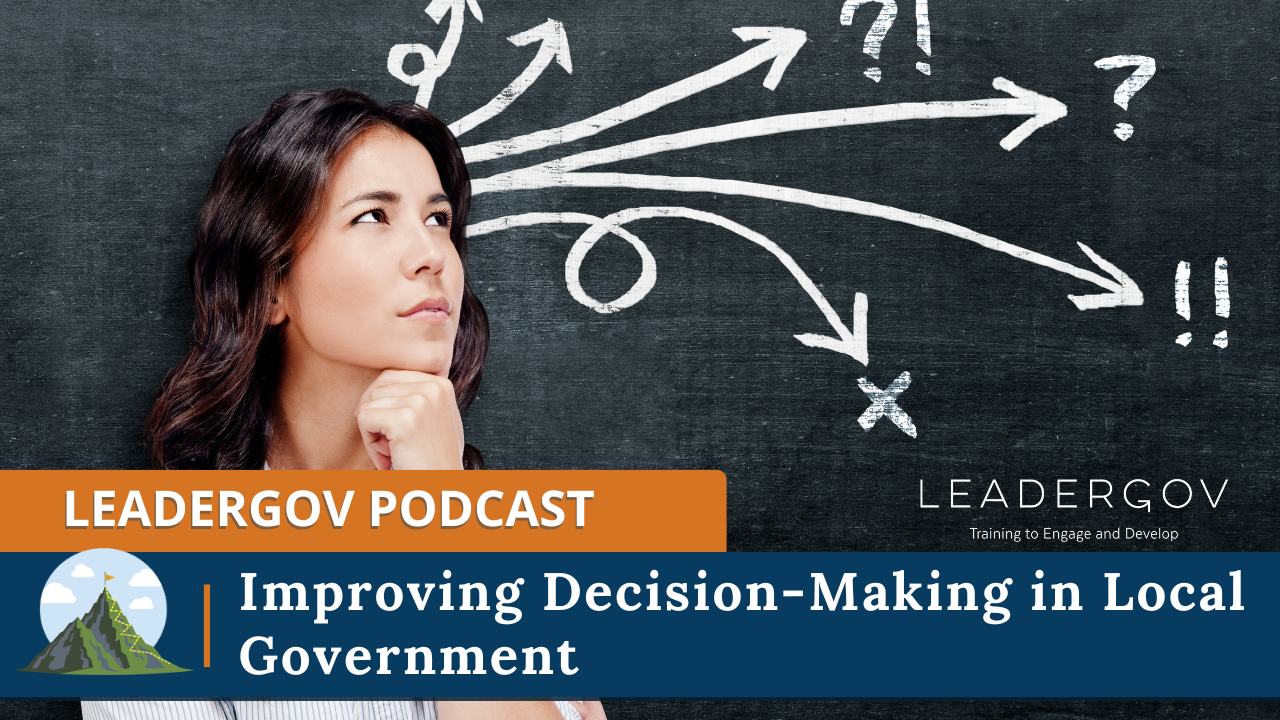Improving Decision-Making in Local Government

Improving Team Decision-Making in Local Government: Insights from Perla of Brownsville, Texas
Effective decision-making is crucial for any organization, and this is especially true in local government. In a recent episode of the LeaderGov Podcast, we had the privilege of hearing from Perla, the Director of Organizational Development and Human Resources for the City of Brownsville, Texas. With nearly a decade of experience in HR and organizational development, Perla shared valuable insights on how leaders can make better decisions that benefit their teams, organizations, and the communities they serve.
Learning from Mistakes: The Power of Reflection in Leadership
When asked about the toughest decision she’s made, Perla was open about the challenges she faced in the past. She recalled times when the pressure to fill vacant positions led her to make rushed hiring decisions. These quick decisions, made with the best of intentions to support her team, ultimately resulted in hiring individuals who weren’t the best fit for the department.
Perla emphasized the importance of involving the team in the decision-making process, especially when hiring. She admitted that by neglecting to seek input from her team, she overlooked red flags that could have prevented mismatches. This had a negative impact on team morale and the overall effectiveness of the department. Her takeaway? "Sometimes you have to slow down to involve the team in decisions, as their feedback can prevent issues down the road."
Building a Culture of Collaboration and Inclusion
Perla believes that to make better decisions, leaders must foster a culture of collaboration where team members feel valued and heard. “It’s not just about asking for input,” she explained. “It’s about creating an environment where team members feel that their contributions truly matter.”
One way Perla engages her team is by starting with the "why" of a project or initiative. Whether the project is big or small, she ensures that her team understands the purpose and goals behind it before seeking their input. She actively encourages honest feedback and ensures that the environment remains safe for everyone to share their ideas, even when those ideas may challenge the status quo.
In her experience, this approach leads to more thoughtful decisions and strengthens the team’s commitment to the outcome. “When you make decisions with your team, not just for them, it creates ownership and leads to more sustainable results,” Perla said.
The Power of Participatory Leadership
A key philosophy that Perla promotes in Brownsville is participatory leadership. This leadership style encourages leaders to listen to and involve their teams in decision-making processes. Brownsville’s "One City" philosophy reflects this belief in collaboration, extending beyond just the city’s departments to include schools, businesses, and the community at large.
Participatory leadership isn’t just about making decisions together; it’s about creating a culture where every employee, regardless of their title, feels like a leader. "Leadership is how we show up every day, in every decision we make," said Perla. "Whether it's answering a citizen’s call or leading a project, each action is an opportunity to lead and serve."
One example of participatory leadership in action was a cultural assessment Perla and her team conducted last year. With a goal to measure employee wellbeing, the survey saw a remarkable 86% participation rate—a testament to the engaged culture fostered in Brownsville. By gathering feedback from all levels of the organization, the team was able to develop action plans that improved the overall wellbeing of employees, which in turn enhanced service delivery to the community.
Why Participatory Leadership Works
When employees are given the opportunity to contribute to decisions, they not only feel more valued but are also more motivated to act on those decisions. Perla’s participatory leadership philosophy has helped Brownsville achieve positive outcomes, from improved employee engagement to better community services. "When we make decisions with our team, we create a sense of ownership that leads to better results for everyone," she explained.
This participatory approach was also evident in the success of the Women's Leadership Conference organized by the City of Brownsville. Initiated by the city manager, this event was the result of collaboration among female leaders in various city departments. The employees were involved in every aspect of the conference, from creating the agenda to selecting panelists, ensuring that the event was meaningful and impactful.
Key Takeaways for Local Government Leaders
- Involve Your Team: Engage your team early in the decision-making process. Ask for input, create a safe space for honest feedback, and make them feel like their contributions matter.
- Slow Down: Don’t rush decisions, especially when hiring or making changes that affect your team. Take the time to gather input and assess potential impacts.
- Start with the Why: Help your team understand the purpose and goals behind any initiative. When people understand the bigger picture, they’re more likely to contribute positively.
- Embrace Participatory Leadership: Involve your team in decisions—not just for their sake, but to build a culture of collaboration that leads to sustainable results.
- Celebrate Wins: Recognize and celebrate team accomplishments. Acknowledging success fosters motivation and reinforces a positive organizational culture.
Final Thoughts
Effective leadership in local government is about more than just making decisions; it’s about fostering a culture where collaboration and inclusion are valued. By embracing participatory leadership, leaders like Perla in Brownsville are not only improving internal processes but also ensuring that their communities receive the best possible service.
As Perla puts it, "When we lead together, we can achieve anything as a city." Local government leaders can take this to heart by focusing on collaborative decision-making, engaging their teams, and always striving to serve their communities with integrity and care.

